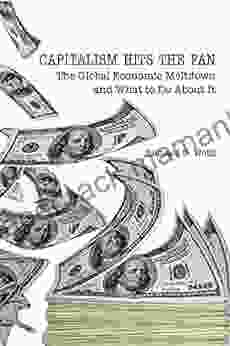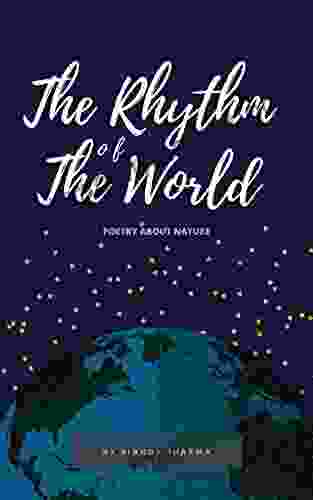The Global Economic Meltdown and its Aftermath: A Comprehensive Guide

The global economic crisis that unfolded in 2008 is widely considered to be the worst financial crisis since the Great Depression of the 1930s. The collapse of major financial institutions, the ensuing credit crunch, and the subsequent recession had a devastating impact on economies around the world. This article provides a comprehensive overview of the global economic meltdown, its causes, its impact, and the measures taken to address it.
The global economic meltdown was triggered by a combination of factors, including:
1. Subprime Mortgage Crisis:At the heart of the crisis was the widespread issuance of subprime mortgages to borrowers with poor credit histories. These mortgages were often characterized by low initial interest rates that reset to higher rates after a few years, making them unaffordable for many borrowers.
4.3 out of 5
| Language | : | English |
| File size | : | 502 KB |
| Text-to-Speech | : | Enabled |
| Screen Reader | : | Supported |
| Enhanced typesetting | : | Enabled |
| Word Wise | : | Enabled |
| Print length | : | 302 pages |
2. Credit Default Swaps (CDS):CDS, a form of insurance against default on debt instruments, played a major role in amplifying the crisis. Banks sold and bought CDS, creating a complex web of interconnected risks. When a large number of subprime loans defaulted, the CDS market collapsed, leading to massive losses for financial institutions.
3. Lack of Regulation:Insufficient regulation in the financial industry allowed for excessive risk-taking and the proliferation of complex financial products that were not fully understood. Credit rating agencies also played a role by assigning high ratings to subprime securities, which contributed to the perception of low risk.
4. Global Imbalances:Disparities in economic growth between developed and developing countries, particularly the large trade deficit between the United States and China, contributed to global imbalances that put strain on the international financial system.
1. Economic Downturn:The meltdown led to a severe global recession, with many countries experiencing negative growth rates. Unemployment soared, businesses closed, and consumer spending plummeted.
2. Financial Sector Collapse:Major financial institutions, including Lehman Brothers and Bear Stearns, collapsed or required government bailouts. The ensuing credit crunch made it difficult for businesses and consumers to obtain loans.
3. Loss of Confidence:The crisis eroded public trust in financial institutions and governments. Fear and uncertainty prevailed, leading to a sharp decline in investment and economic activity.
To address the global economic meltdown, governments and central banks around the world implemented a range of measures, including:
1. Fiscal Stimulus:Governments increased spending and reduced taxes to stimulate economic growth and demand.
2. Monetary Easing:Central banks lowered interest rates and engaged in quantitative easing to increase the supply of money in the economy.
3. Bank Bailouts:Governments intervened to save major financial institutions from collapse. These bailouts were often controversial and raised concerns about moral hazard.
4. Financial Sector Reforms:Regulatory reforms were introduced to address the weaknesses in the financial system that contributed to the crisis, including stricter capital requirements for banks and increased oversight of financial markets.
The global economic meltdown had a lasting impact on economies and societies around the world. Here are some of the key post-crisis developments:
1. Sovereign Debt Crisis:The crisis also triggered a sovereign debt crisis in several European countries, including Greece, Portugal, and Ireland. These countries struggled to repay their debts, leading to austerity measures and political instability.
2. Rise of Populism and Nationalism:The economic downturn and subsequent austerity measures contributed to a rise in populist and nationalist movements around the world, as people sought scapegoats and alternative solutions to their economic problems.
3. Changing Economic Landscape:The crisis accelerated the shift towards a globalized and interconnected economy, with emerging markets playing a more prominent role in global trade and investment.
4. Increased Inequality:The economic downturn exacerbated income and wealth inequality, with the gap between the rich and the poor widening in many countries.
The global economic meltdown of 2008 was a profound event that tested the resilience of the international financial system and had far-reaching consequences. The causes of the crisis, including subprime mortgages, CDS, lack of regulation, and global imbalances, are well-documented. The impact of the crisis was severe, leading to a global recession, the collapse of the financial sector, and a loss of confidence. Governments and central banks implemented a range of measures to address the meltdown, including fiscal stimulus, monetary easing, bank bailouts, and financial sector reforms. The aftermath of the crisis has been characterized by sovereign debt crises, the rise of populism and nationalism, a changing economic landscape, and increased inequality. Understanding the causes, impact, and aftermath of the global economic meltdown is essential for preventing future financial crises and ensuring a more stable and sustainable global economy.
4.3 out of 5
| Language | : | English |
| File size | : | 502 KB |
| Text-to-Speech | : | Enabled |
| Screen Reader | : | Supported |
| Enhanced typesetting | : | Enabled |
| Word Wise | : | Enabled |
| Print length | : | 302 pages |
Do you want to contribute by writing guest posts on this blog?
Please contact us and send us a resume of previous articles that you have written.
 Top Book
Top Book Novel
Novel Fiction
Fiction Nonfiction
Nonfiction Literature
Literature Paperback
Paperback Hardcover
Hardcover E-book
E-book Audiobook
Audiobook Bestseller
Bestseller Classic
Classic Mystery
Mystery Thriller
Thriller Romance
Romance Fantasy
Fantasy Science Fiction
Science Fiction Biography
Biography Memoir
Memoir Autobiography
Autobiography Poetry
Poetry Drama
Drama Historical Fiction
Historical Fiction Self-help
Self-help Young Adult
Young Adult Childrens Books
Childrens Books Graphic Novel
Graphic Novel Anthology
Anthology Series
Series Encyclopedia
Encyclopedia Reference
Reference Guidebook
Guidebook Textbook
Textbook Workbook
Workbook Journal
Journal Diary
Diary Manuscript
Manuscript Folio
Folio Pulp Fiction
Pulp Fiction Short Stories
Short Stories Fairy Tales
Fairy Tales Fables
Fables Mythology
Mythology Philosophy
Philosophy Religion
Religion Spirituality
Spirituality Essays
Essays Critique
Critique Commentary
Commentary Glossary
Glossary Bibliography
Bibliography Index
Index Table of Contents
Table of Contents Preface
Preface Introduction
Introduction Foreword
Foreword Afterword
Afterword Appendices
Appendices Annotations
Annotations Footnotes
Footnotes Epilogue
Epilogue Prologue
Prologue Jeffrey Allen Weesner
Jeffrey Allen Weesner Dale A Olsen
Dale A Olsen Erik E Hanberg
Erik E Hanberg Johnny Ray
Johnny Ray Michael Margolis
Michael Margolis Mary Poppendieck
Mary Poppendieck John G Gabriel
John G Gabriel Jack E Davis
Jack E Davis Heather L Clark
Heather L Clark Nicholas Popowich
Nicholas Popowich Robert Greene
Robert Greene Chanelle Arterbridge
Chanelle Arterbridge Peter Zeihan
Peter Zeihan Jack Slater
Jack Slater Nick Duffell
Nick Duffell Matt Reiner
Matt Reiner Andrew J Clark
Andrew J Clark Michael Mackison
Michael Mackison Michael Clark
Michael Clark Jake Adelstein
Jake Adelstein
Light bulbAdvertise smarter! Our strategic ad space ensures maximum exposure. Reserve your spot today!
 Robert FrostFollow ·19k
Robert FrostFollow ·19k Federico García LorcaFollow ·9.1k
Federico García LorcaFollow ·9.1k Corbin PowellFollow ·18.7k
Corbin PowellFollow ·18.7k Charles DickensFollow ·4.1k
Charles DickensFollow ·4.1k Charlie ScottFollow ·4.5k
Charlie ScottFollow ·4.5k Reginald CoxFollow ·12.5k
Reginald CoxFollow ·12.5k Anthony BurgessFollow ·8.1k
Anthony BurgessFollow ·8.1k Dominic SimmonsFollow ·2.5k
Dominic SimmonsFollow ·2.5k

 Jeremy Mitchell
Jeremy MitchellPlay We Now On Christmas Violin Christmas: A Heartfelt...
Play We Now On...

 Terry Bell
Terry BellTales from the Road: Confessions of an Atlanta Uber...
In the vibrant...

 Ervin Bell
Ervin BellThe French Admiral: A Gripping Naval Adventure with Alan...
In the vast expanse of...

 Henry David Thoreau
Henry David ThoreauCrochet Cozy Afghan Patterns: Crochet Weekend Afghan...
to Crochet...

 Orson Scott Card
Orson Scott CardAn Archaeological View Of The Industrialization Of North...
The industrialization of North America was a...

 Josh Carter
Josh CarterClipboard Christmas Skits by Tom Spence: A Festive...
A Christmas...
4.3 out of 5
| Language | : | English |
| File size | : | 502 KB |
| Text-to-Speech | : | Enabled |
| Screen Reader | : | Supported |
| Enhanced typesetting | : | Enabled |
| Word Wise | : | Enabled |
| Print length | : | 302 pages |












